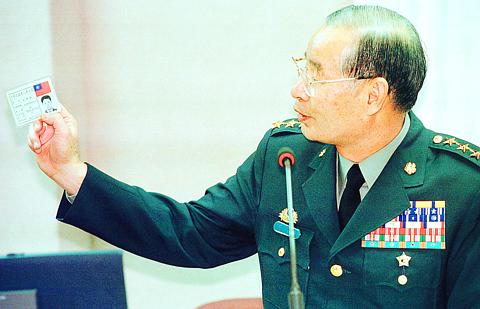Chief of the General Staff General Tang Yao-ming (
"Taiwan's air force does not maintain any secret or publicly known bases in foreign countries. But it does have a second-strike capability," Tang said at his first appearance at the legislature's Defense Committee following the March 18 presidential election. Tang was responding to inquiries from lawmakers over the reported plan to fly planes to a safe destination to avoid initial attacks and then use those aircraft to reinforce a second strike -- much like Iraq did during the 1992 Gulf War where it sent planes to neighboring Iran to avoid being destroyed by US-led allied forces.
Despite Tang's denial, sources speaking on customary anonymity told the Taipei Times that the government is in fact planning to make such a request to the Philippines as part of the terms for the continuing civil aviation talks between the two sides.

PHOTO: LIBERTY TIMES
"The Philippines is not the only choice for the air force in this matter. There are several other choices on the list. We don't know which country will be our final choice. But the groundwork will have been laid in advance of any eventuality," said the source.
Tang also made reference to the acquisition of new short- and medium-range surface-to-surface missiles which analysts expect will be brought into operation in the next few years, greatly enhancing the military's current arsenal.
DPP lawmaker Li Chih-hsiung (
Meanwhile, Tang shed some light on the military's plans to build its own surface-to-surface missiles.
"The cost for these missiles is very high. Each short-range missile costs around NT$20 million, while a medium-range one can run as high as NT$30 million. The operational cost for all the missiles will be billions of NT dollars," he said.
With the continuous modernization of the armed forces, Tang assured lawmakers that Taiwan still enjoys an advantage over China in its conventional warfare capability, although it is weaker in space and high-tech sectors.
Tang also conceded that there are some serious problems with the armed forces, especially in respect to the shortage of specialized personnel.
"The kinds of personnel which the armed forces are short of include non-commissioned officers [NCOs], officers at the level of captain, pilots, and company leaders in the army," Tang said.
"This personnel shortage is one of the most serious problems hampering the progress of the military's build-up. One of the major factors for the situation is the relatively low rate of pay," he said.
"The pay for an enlistee is obviously lower than that for a police officer or a public servant. If the salary for a serviceman is raised by 50 percent and the armed forces are still short of people, I will step down to take responsibility."
Lawmaker Wang Tien-ging (王天競) of the People First Party disagreed with Tang's assessment that salary was the main problem in the armed forces, saying that a serviceman's sense of honor and duty to his country should make up for the lack of pay.

Conflict with Taiwan could leave China with “massive economic disruption, catastrophic military losses, significant social unrest, and devastating sanctions,” a US think tank said in a report released on Monday. The German Marshall Fund released a report titled If China Attacks Taiwan: The Consequences for China of “Minor Conflict” and “Major War” Scenarios. The report details the “massive” economic, military, social and international costs to China in the event of a minor conflict or major war with Taiwan, estimating that the Chinese People’s Liberation Army (PLA) could sustain losses of more than half of its active-duty ground forces, including 100,000 troops. Understanding Chinese

The Ministry of Foreign Affairs (MOFA) yesterday said it is closely monitoring developments in Venezuela, and would continue to cooperate with democratic allies and work together for regional and global security, stability, and prosperity. The remarks came after the US on Saturday launched a series of airstrikes in Venezuela and kidnapped Venezuelan President Nicolas Maduro, who was later flown to New York along with his wife. The pair face US charges related to drug trafficking and alleged cooperation with gangs designated as terrorist organizations. Maduro has denied the allegations. The ministry said that it is closely monitoring the political and economic situation

UNRELENTING: China attempted cyberattacks on Taiwan’s critical infrastructure 2.63 million times per day last year, up from 1.23 million in 2023, the NSB said China’s cyberarmy has long engaged in cyberattacks against Taiwan’s critical infrastructure, employing diverse and evolving tactics, the National Security Bureau (NSB) said yesterday, adding that cyberattacks on critical energy infrastructure last year increased 10-fold compared with the previous year. The NSB yesterday released a report titled Analysis on China’s Cyber Threats to Taiwan’s Critical Infrastructure in 2025, outlining the number of cyberattacks, major tactics and hacker groups. Taiwan’s national intelligence community identified a large number of cybersecurity incidents last year, the bureau said in a statement. China’s cyberarmy last year launched an average of 2.63 million intrusion attempts per day targeting Taiwan’s critical

‘SLICING METHOD’: In the event of a blockade, the China Coast Guard would intercept Taiwanese ships while its navy would seek to deter foreign intervention China’s military drills around Taiwan this week signaled potential strategies to cut the nation off from energy supplies and foreign military assistance, a US think tank report said. The Chinese People’s Liberation Army (PLA) conducted what it called “Justice Mission 2025” exercises from Monday to Tuesday in five maritime zones and airspace around Taiwan, calling them a warning to “Taiwanese independence” forces. In a report released on Wednesday, the Institute for the Study of War said the exercises effectively simulated blocking shipping routes to major port cities, including Kaohsiung, Keelung and Hualien. Taiwan would be highly vulnerable under such a blockade, because it